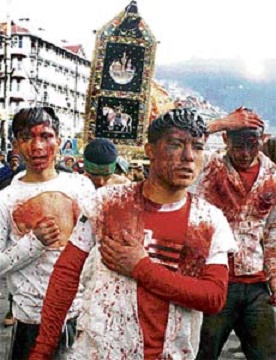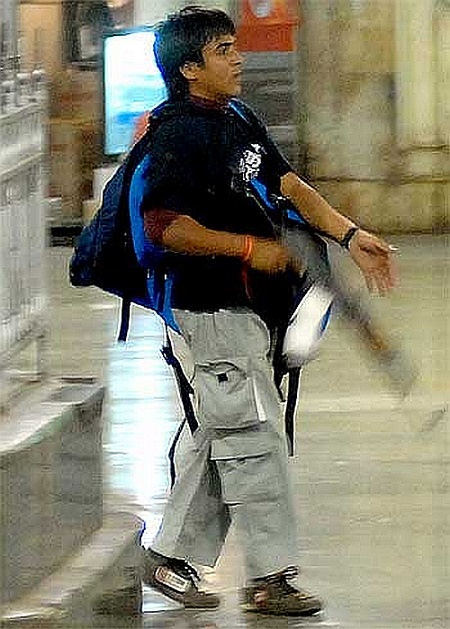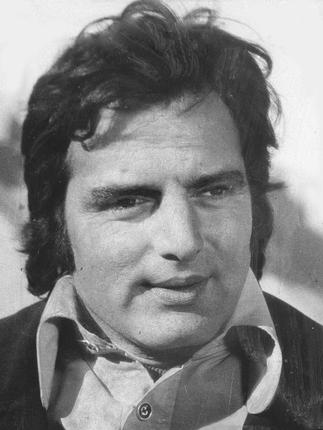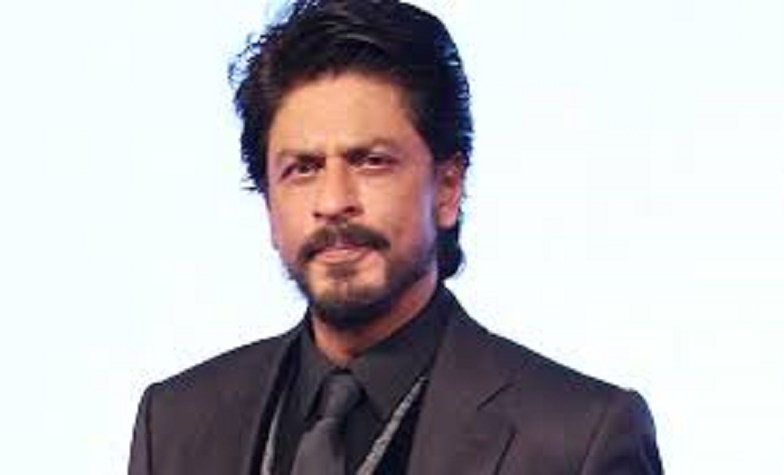Shahrukh Khan is among the most famous people in India. His popularity and influence now extend well beyond the reel world. As the owner of the IPL cricket team, Kolkata Knight Riders, he has become a power player in the high-octane world of Twenty/20 which is followed by hundreds of millions of people worldwide. The likes of Brendon McCullum and John Buchanan are known to genuflect at a mere signal from him. Congress politicians and their children queue up to get his autographs. Clearly, SRK wields power.
With power comes responsibility. But SRK has not lived up to it. On the contrary, he has abused his power and hurt the sentiments of millions of his supporters with his anti-Hindu stance. Now he has ramped up the anti-Hindu rhetoric with his statement that there is “extreme intolerance” in India.
 This is not an offhand remark. Over the years, SRK movies have shown Hinduism in a bad light. For instance, in one movie he slyly questions idol worship. Would he question Islamic beliefs such as why Shias need to flog their own bodies into a bloody mess during Id? Or more pertinently, why Muslims pray in the streets and block traffic.
This is not an offhand remark. Over the years, SRK movies have shown Hinduism in a bad light. For instance, in one movie he slyly questions idol worship. Would he question Islamic beliefs such as why Shias need to flog their own bodies into a bloody mess during Id? Or more pertinently, why Muslims pray in the streets and block traffic.
An Enquiry into the Nature of SRK’s Tolerance
Let’s start with SRK’s strange obsession with Pakistan. Don’t get me wrong – I’m not saying you should love India alone. By all means, go ahead and love any country you want – Germany, Kazakhstan, Russia, El Salvador, even the USA.
Love that transcends national boundaries is fine with me – as long as that country is not a jihad factory. And Pakistan is clearly a terror hothouse where international jihadis are incubated – with the active support of the state and enthusiastic participation by the common people.
For a chilling picture of what the world should be prepared for from Pakistan’s jehad factory, read this: http://www.hks.harvard.edu/fs/jstern/pakistan.htm and this: http://www.rferl.org/content/pakistan-education-jihad-islam-khyber/25092236.html.
And yet this is what SRK said in 2010 after the billion-dollar Indian Premier League (IPL) decided not to accept Pakistani cricket players: ‘‘Pakistan is a great neighbour to have. We are great neighbours, they are good neighbours. Let us love each other. Let me be honest. My family is from Pakistan, my father was born there and his family is from there.’’
Really? In what universe is Pakistan a great neighbour? One doesn’t have to reel off statistics to prove Pakistan is by no means a good neighbour to have. Virtually every terrorist attack on the planet can be traced back to Pakistan – the latest being San Bernardino. It is a measure of Pakistan’s reputation that ‘Paki’ tops the totem pole of four-letter words in Britain.
Banning Pakistanis
So why had the IPL banned Pakistani players? Well, just two years earlier, 10 Pakistani terrorists had raided the city of Mumbai, killing 154 and injuring hundreds of Indians and foreign tourists. The terrorists struck a railway station during rush hour, luxury hotels, a synagogue and a maternity hospital. Yes, read that again – a maternity hospital.
 These are the targets chosen by SRK’s beloved country.
These are the targets chosen by SRK’s beloved country.
The attackers were trained by the Pakistani military and intelligence agencies, which continue to spawn an endless supply of terrorists that are sent not only to India but to every troublespot in the world. Sometimes they are sent to places you wouldn’t think of as troublespots – such as New Zealand. (http://www.stuff.co.nz/auckland/local-news/local-blogs/dark-matter/8819157/What-are-Pakistani-terrorists-doing-in-New-Zealand)
And yet, Khan thinks Pakistan is a good neighbour to have. With his sweeping statements, Khan insulted the memory of the innocent civilians who were brutally killed and the commandos and policemen who died in their attempt to free Mumbai from the jihadis in November 2008.
While the Indian government and most of the leftist media networks tried to suppress the stories of tortures of the hostages, at least one website didn’t sanitise the truth. Doctors, who had conducted post-mortems on the victims, told Rediff.com (http://www.rediff.com/news/2008/nov/30mumterror-doctors-shocked-at-hostagess-torture.htm) they had not seen anything like this in their lives.
‘‘I have seen bodies of riot victims, gang war and previous terror attacks like bomb blasts. But this was entirely different. It was shocking and disturbing,’’ one doctor said.
Another said: ‘‘I have seen so many dead bodies in my life, and was yet traumatised….It was obvious they were tied up and tortured before they were killed. It was so bad that I do not want to go over the details even in my head again.”
Remember, these were civilians not combatants. While Rediff has left out the gory details of the tortures, sources in the know say children’s fingernails were pulled out in front of their parents, before they were shot.
But all this doesn’t disturb Khan. Not even the fact that among the victims were over 50 Muslims. Khan seems to be saying it’s okay to live with Pakistan tormenting India at will. For such people – including dumb liberals, Marxists, secularists and AAPtards– a candlelight vigil or a minute’s silence is enough to counter terrorism.
Do you remember the 2008 picture of well-dressed Indian tykes (apparently belonging to upper class Indian families) holding up placards saying, ‘‘Terrorist Uncle, please stop the killings.’’ This is obviously SRK’s fan base. This fan base is dwindling and I’ll come to that in a moment.
Speaking on this group of Indians, who unwittingly support the unlikely triumvirate of liberals, leftists and terrorists, R. Vaidyanathan, analyst and professor of finance, Indian Institute of Management-Bangalore, wrote in 2008: The attitude of this class is that “if we are slapped on both the cheeks we should feel bad that we do not have a third cheek to show. Such is our strategic thinking in this complex world since the elite don’t think through issues”.
A History of Supporting Pakistanis
In February 2007, after losing the T-20 World Cup final match to India, Shoaib Malik the captain of the Pakistani cricket team apologised to ‘‘Muslims all over the world’’ for not being able to beat India. That statement made many Indian Muslims cringe. After all, there were two Muslim players in the Indian side that beat the Pakistanis. In fact, it is a measure of how much they identified with India that those two Muslim players, Irfan Khan and Zaheer Khan, were always more aggro when they played against Pakistan.
But what did SRK do? He tried to defend Malik in a subsequent interview. “I don’t think he meant to segregate Muslims and Christians and Hindus and say this was a match between Islam and Hinduism,” he said.
Who the hell told you that SRK? Did the Pakistani cricketer phone you up and personally tell you what he ‘really’ meant?
It seems SRK is some sort of middleman who is trying to validate Pakistani players for Indian team owners. Disappointed at the Indian cricket board’s decision to ban the Pakistani players, he said it was humiliating to him as a team owner that no one bid for the Pakistani players despite them being put up for auction. “They are the champions, they are wonderful but somewhere down the line there is an issue and we can’t deny it,” he told a news channel.
But SRK is the one living in denial. In fact, he had as many as five players from Pakistan playing for his team Kolkata Knight Riders in the IPL’s first edition in 2007. What does that tell you about his feelings towards Pakistan?
SRK’s record in hurting Indian sensibilities remains consistent. In 2009 when the IPL cricket tournament was temporarily moved to South Africa, he replaced the highly popular Sourav Ganguly as skipper and foisted New Zealander Brendon McCullum on his team. Much like his performance in New Zealand, McCullum was a complete disaster.
John Buchanan, his Australian coach, publicly insulted Indian players. ‘‘Sourav, Dravid and Laxman have reached the twilight in T20 cricket,’’ he said in a press conference. Anyone who had seen Ganguly and Dravid bat in 2010 would have thought Buchanan was stark, raving mad. SRK did not reprimand Buchanan for snubbing the three all-time greats. The actor had no reason to be outraged because Buchanan had insulted Indians not Pakistanis.
Feroz Khan: True patriot
Celebrities from minority communities have an even bigger responsibility because they – often unwittingly – become the face of the community. This is something the late Indian actor Feroz Khan understood.
 Several years ago, responding to a provocative Pakistani TV anchor, the actor shot back: ‘‘India is a secular country where a Sikh Prime Minister and a Muslim President are the pride of the nation, unlike Pakistan which was created for Muslims but where Muslims are killing each other.’’
Several years ago, responding to a provocative Pakistani TV anchor, the actor shot back: ‘‘India is a secular country where a Sikh Prime Minister and a Muslim President are the pride of the nation, unlike Pakistan which was created for Muslims but where Muslims are killing each other.’’
Feroz Khan’s statement mattered because it went a big way in reinforcing in the Indian Muslim’s mind that Pakistan is indeed a disaster. Coming from a popular Indian Muslim, it drilled home the message that Indian Muslims should not look at Pakistan as some sort of promised Islamic land west of the border.
Feroz Khan’s statement sent the Muslims of Pakistan into a tizzy. Ever since the creation of Pakistan, the people of that country have believed – more in hope than faith – that Indian Muslims are a fifth column within India who will one day overthrow the Hindus and complete the ultimate aim of Pakistan, which is to recover the lost ‘glory’ of the medieval Muslim empires. To be sure, many Indian Muslim clergymen and politicians have voiced exactly such sentiments but largely Indian Muslims no longer believe in such rubbish. The evidence is before them – Pakistan is a failed nation and is nothing less than a hell for Muslims.
So when Feroz Khan rubbished Pakistan, there was a great deal of heartburn, bewilderment and anger among sections of the Pakistani elites.
SRK on the other hand is playing spoiler. By shooting off his mouth, he is undoing all the good work achieved by the likes of Feroz Khan and other truly nationalist Muslims such as Tufail Ahmed, columnist at IndiaFacts.
Calling the Bluff
Like SRK, many male Muslim celebrities are married to Hindu women. These Muslim men bizarrely say it proves their secular credentials. This is facetious because a Muslim man marrying a Hindu woman has nothing to do with tolerance.
We all know what the so-called secular – but in reality closet Hindu hater – Aamir Khan said about his family: “My children will be brought up as Muslim.”
Now look at the flip side. Few Muslim women are married to Hindu men. Back in the 1950s, when top actors Dev Anand and Suraiyya announced they would tie the knot, the Muslims of Mumbai threatened to riot. The Muslim clergy vocally disapproved of a Muslim woman marrying a Hindu. Back then, none of the Muslim actors came out in support of the deep love that Dev Anand and Suraiyya had for each other. The marriage was called off.
The reality is Muslim men only want to marry Hindu women. It’s a one-way street where Muslim women are not allowed to marry Hindu men. It’s about acquisition. Marrying a Hindu woman is like a victory – they have brought over someone from the kafirs into the camp of the believers. One less Hindu, one more Muslim. And since it’s a woman, one more womb for breeding more Muslims. What could be better?
Ghazwa-e-Hind – or the conquest of India – is at the back of the mind of many Muslims. It is the unfinished business of the Muslim conquest of Hindustan. Muslim men who marry Hindu women are congratulated by their community. Since only the very elites are able to do this, it becomes an even more prestigious and sought after badge.
In this backdrop, the true test will be when famous people such as Naseeruddin Shah, SRK and Aamir Khan – who proudly claim they are secular because they are married to Hindu women – allow their daughters to marry Hindu boys. The good money is on this not happening.
Dwindling Fan Base
Because you cannot fool all of the people all of the time, SRK fan club members are saying goodbye and good riddance. The actor’s comment on “extreme intolerance” in India has upset millions of his fans.
Many Indians are refusing to watch his latest movie Dilwale. Pressure from several Hindu organisations has led to cinemas around the country cancelling shows. The Twitter hashtag #boycottDilwale is gaining traction.
Member of Parliament Yogi Adityanath compared SRK to Pakistani terrorist Hafiz Saeed, and the holy woman Sadhvi Prachi called the actor a “Pakistani agent”.
Facing fire from his fans – and very likely his producers – SRK gave an interview to ABP News, saying he was being “misunderstood” and that he did not believe India is intolerant. But watch the interview here, (https://www.youtube.com/watch?v=xGmnU_1bcVs) from 1.26 to 1.33 seconds. He is not apologising but in fact being sarcastic: “Everything is all right in our country. God bless India. Long live us. Long live us Indians. There is no problem at all.”
The secular media has simply translated his words into English and claimed he has apologised. But they ignore the petulant, mocking tone in which he said these words.
But social media isn’t as forgiving as the mainstream media and the boycott calls are being taken up by millions of people all over India. SRK’s fan base is indeed eroding and it is young Indians – fed up with Indian seculars and their tolerance of Pakistan – who are saying goodbye to SRK.
The Lou Grant Factor
Not many people remember Lou Grant, an American television drama series starring the charismatic Ed Asner in the lead role as a newspaper editor. Aired from 1977 to 1982, it was a runaway success until it was suddenly cancelled. The reason: Asner’s views on Nicaragua, which did not align with the right wing administration of Ronald Reagan.
The actor said the Sandinista guerrillas should be allowed to come to power even if it meant the loss of American influence in the country. Reagan was at that time supporting the murderous Contras, which had pretty much destroyed the tiny Central American nation.
Asner, being an amiable guy, just meant well. He was supporting the good guys in a murderous war. And yet he was crucified professionally. Reagan belonged to a long line of scumbag US presidents who destroyed the careers of Americans who disagreed with the US policy of meddling in the affairs of foreign countries.
Indians need not subject SRK to the same jingoistic keel-hauling, but at least they should demand some accountability from the actor they have cherished for more than two decades. Dancing at weddings may be a easy moonlighting cash, but SRK forgets that he owes his wealth, fame and adulation to India and its Hindu majority who buy tickets for his movies with their own hard earned money and have made him enormously wealthy.
If he continues to label India – and by implication Hindus – as an intolerant nation, then fans should boycott his films. SRK’s oxygen is publicity and he’ll fade away once the adulation ends.
Rakesh is a globally cited defence analyst. His work has been published by the Centre for Land Warfare Studies, New Delhi; Russia Beyond, Moscow; Hindustan Times, New Delhi; Business Today, New Delhi; Financial Express, New Delhi; BusinessWorld Magazine, New Delhi; Swarajya Magazine, Bangalore; Foundation Institute for Eastern Studies, Warsaw; Research Institute for European and American Studies, Greece, among others.
As well as having contributed for a research paper for the US Air Force, he has been cited by leading organisations, including the US Army War College, Pennsylvania; US Naval PG School, California; Johns Hopkins SAIS, Washington DC; Centre for Air Power Studies, New Delhi; Carnegie Endowment for International Peace, Washington DC; Rutgers University, New Jersey; Institute of International and Strategic Relations, Paris; Institute for Strategic, Political, Security and Economic Consultancy, Berlin; Siberian Federal University, Krasnoyarsk; Institute for Defense Analyses, Virginia; International Center for Not-for-Profit Law, Washington DC; Stimson Centre, Washington DC; Foreign Policy Research Institute, Philadelphia; Center for Strategic & International Studies, Washington DC; and BBC.
His articles have been quoted extensively by national and international defence journals and in books on diplomacy, counter terrorism, warfare, and development of the global south.

